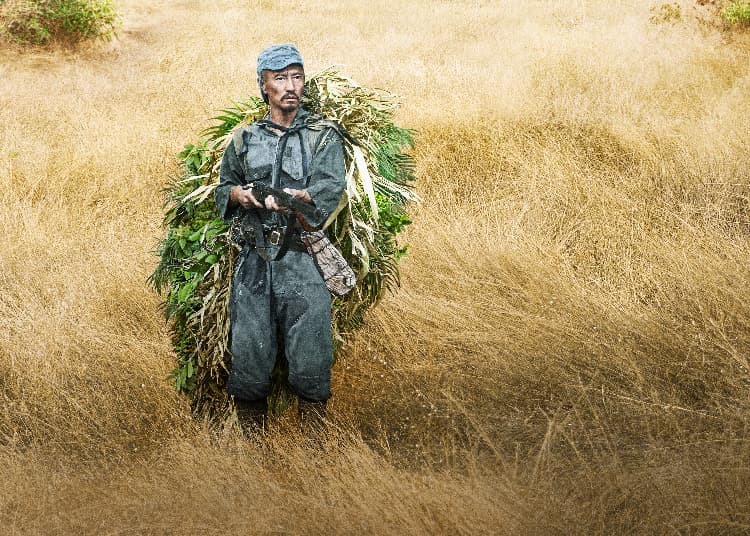
* * *
At close to three hours in length, “Onoda: 10,000 Nights in the Jungle” has the breadth — “luxury” being, in this case, too crass a word — to settle itself into any number of categories: epic drama, absurdist fable, psychological meditation, cultural exegesis and, that old stand-by, truth is stranger than fiction.
Director Arthur Harari, who worked on the screenplay with Vincent Poymiro and Bernard Cendron, based “10,000 Nights in the Jungle” on the story of Hiroo Onoda (1922-2014), a lieutenant in the Imperial Japanese Army stationed in the Philippines who did not give up his guns until three decades after the end of World War II. Ever the good soldier, Onoda wouldn’t surrender until he received word from his commanding officer — who was, against significant odds, alive, well and operating a bookstore in 1974.
There’s some kind of sociological lesson to be gleaned from the fact that Onoda was one of many zanryū nipponhei — that is to say, “remaining soldiers” — who were poised for battle long after hostilities had ended. To his credit, Mr. Harari forgoes armchair — or, rather, director’ s chair — theorizing to concentrate on the day-to-day and year-by-year exigencies of, take your pick, serving with honor or working under a delusion.
What he’s basically crafted is a Western with the fictionalized Onoda being a not-too-distant cousin of the drifters, rogues, loners and roustabouts who mosey their way through the movies of Raoul Walsh, John Ford, Monte Hellman and Sergio Leone — all of whom Mr. Harari claims as inspiration. The empty vistas navigated by the last-man-standing also bring to mind the testosterone-fueled poetics of Akira Kurosawa.
Two actors star as Onoda: Yūya Endo as the wiry recruit and Tsuda Kanji as the grizzled holdout. The former plays Onoda as tense and almost preternaturally sweaty, a driven young man who ends up in a specialized intelligence unit. “You are no longer ordinary soldiers!” shouts Major Taniguchi (Issey Ogata) as the men are ready to be sent off on assignment. “You are forbidden,” he adds, making a pointed reference to the mores of Japanese military culture, “from killing yourself!”
The war is winding down when Onoda arrives in Lubang in December 1944. The troops on the scene are exhausted, jaded and resistant to the lieutenant’s directives. Onoda gathers together a ragtag group of like-minds to continue the fight, and they head off into the jungle for the greater good of Japan. Along their travels, they encounter the stray donko — a slang term, likely derogatory, for Filipino locals — and struggle with the rumor that the war is, you know, over.
Through a series of adventures — some lighthearted, most not — Onoda’s crew of four is winnowed down to two, the good lieutenant himself and his second-in-command Corporal Kozuka (initially Yuya Matsuura and then Tetsuya Chiba). The bond between the two men, as well as their shared mania, is unbreakable even when they come upon a transistor radio and listen, enraptured, to radio reports about the New York Yankees visiting their homeland and, later, a man walking on the moon.
Duty knows no end for Oroda until he is tracked down by a tourist (Taïga Nakano) in the early 1970s, who through sheer persistence breaks down, but does not altogether quash, the soldier’s resolve. It’s through the efforts of the tourist — the character goes unnamed throughout the film — that Major Taniguchi is found and ultimately convinced to dismiss the soldier long under his command.
The story of Oroda’s return to Japan isn’t touched upon and, from all reports, would make a feature length film on its own tangled merits. By sticking to Oroda’s thirty-year journey-cum-ordeal, Mr. Harari has put together a movie that could best be described as “Apocalypse Now”, but played out in reverse and considerably less operatic.
The film has its longueurs, and could’ve been shaved down to a less daunting length without much damage to mood or trajectory. Still, “10,000 Days in the Jungle” is a remarkable story told with admirable restraint, highlighting, as it does, yet another byway of a troubled twentieth-century.
(c) 2022 Mario Naves
This article was originally published in the October 5, 2022 edition of The New York Sun.